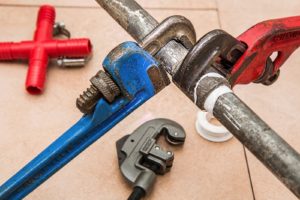 Every job comes with hazards so we take the appropriate precautions and wear the appropriate PPE. Many safety precautions are the same across industries and trades because the same body parts are at risk no matter what the job entails. But each job has hazards that are more common than others, so it’s wise to review safety protocol often. We take for granted the incredible luxury of clean water running into and waste water running out of our buildings. When there’s a problem, plumbers face several dangers during the repair. We’ve written about electrical wiring safety, general job site safety, and now here are 11 plumbing safety tips from the Pros.
Every job comes with hazards so we take the appropriate precautions and wear the appropriate PPE. Many safety precautions are the same across industries and trades because the same body parts are at risk no matter what the job entails. But each job has hazards that are more common than others, so it’s wise to review safety protocol often. We take for granted the incredible luxury of clean water running into and waste water running out of our buildings. When there’s a problem, plumbers face several dangers during the repair. We’ve written about electrical wiring safety, general job site safety, and now here are 11 plumbing safety tips from the Pros.
Personal Plumbing Safety Tips
1. Prepare For the Job. There are no shortage of cliches about preparation so we won’t attempt to create a new one here. But preparing for a plumbing job means looking up the appropriate plumbing and building codes to know what the job entails. Be sure to practice the skills needed – like soldering – before going to the job if you’re rusty. The reality of awkward positions is often more difficult than theory, so be prepared.
2. Protect Your Eyes. Plumbers need them to get the job done. Put on some protective eyewear that won’t fog and leave it on. If you put eyewear on top of your head, it’s easy to forget you’re unprotected.
3. Protect Your Ears. There are plenty of sharp, loud noises on a plumbing job site. Over time, these noises take a toll on a plumber’s hearing if ears are unprotected.
4. Protect Your Arms/Hands. Long sleeves protect against burrs and other cut hazards. Some Pros don’t care for gloves, at least during some of the job, because gloves can impede dexterity. But gloves are an important piece of safety equipment since plumbers can contact animal and human waste, hazardous industrial chemicals, and mold.
5. Protect Your Feet. Walking is inherently more dangerous around puddles. Slip-resistant boots protect the feet and also the whole person from falls. There are even boots like the Keen Utility Tacoma that are resistant to many waste products.
6. Protect Your Lungs. Gloves protect skin from mold but perhaps a greater danger is mold inhalation. Masks protect a plumber’s lungs from mold and dangerous fumes.
7. Protect Your Head. A hard hat won’t always be necessary on a plumbing job, but it’s a good idea to have one handy. Plumbers wear them more often on industrial and new construction jobs.
Jobsite Plumbing Safety Tips
8. Extreme Temperatures. Plumbers experience extreme temperatures from working in attics during the Florida summer to basements in the Minnesota winter. This is no place to be a hero. Plumbers can protect themselves with appropriate workwear, hydration, and common sense.
9. Gas Lines and Power Off. Water, electricity, and combustibles don’t mix. If a plumber smells gas, it’s time to evacuate until the source is found and safety returns.
10. Use The Right Tools. Every tradesman knows the value of the right tool. It makes the job easier, faster, and safer. Part of preparation is anticipating what tools might be needed.
11. Have Emergency Contact Information Handy. The Pros know who to call for all of the systems they contact – gas company, electric company, building supervisor, and homeowner.


Recent Comments